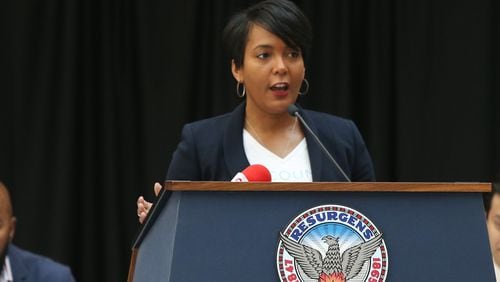Atlanta Mayor Keisha Lance Bottoms on Wednesday announced that the city had reached its goal of raising $50 million to provide 550 homes for the city’s homeless population.
About $25 million came from private donations that range from a few thousand dollars to $15 million. The United Way of Greater Atlanta partnered with the city to raise the money.
The other half is from the Homeless Opportunity Bond sale that began under former Mayor Kasim Reed. Bottoms was on the city council when the plan was approved in 2017.
“This is one of the things I had the fortune of walking into when I was mayor,” Bottoms said.
City officials said the final donation of $114,000 came recently from Ameris Bank, and allowed the city to reach its goal.
“Homelessness leads to broken dreams and shattered potential,” Ameris Chief Executive Officer H. Palmer Proctor Jr. said at a press conference with Bottoms on Wednesday.
Bottoms said there are 3,217 homeless people in Atlanta, half the number that was recorded a decade ago.
One of the city’s most difficult challenges has been connecting people living on the streets to the services available to them, Bottoms said.
The city’s approach to addressing homelessness is based on the concept of rapid rehousing — a philosophy that recognizes most homeless people are forced to the streets after a financial crisis. The idea is to quickly provide a temporary home, which allows them to focus on rebuilding instead of where they will sleep.
Under the rapid rehousing model, the belief is that the faster someone gets back in a home, the more likely they are to avoid becoming homeless again.
“It is a miss-perception that many people have: that homelessness is represented entirely by the people they see on the streets,” said Jack Hardin, Co-Chair of the Atlanta Regional Commission on Homelessness. “A far larger proportion of people experiencing homelessness have incomes and function at very high levels, but live on the margins of the economics of our society and any hardship can derail.”
The city's plan for raising $50 million was announced in 2017, about the same time that it closed the city's largest homeless shelter — a 100,000-square-foot building at the corner of Peachtree and Pine streets that housed as many as 500 people a night, but was also blamed for tuberculosis outbreaks.







